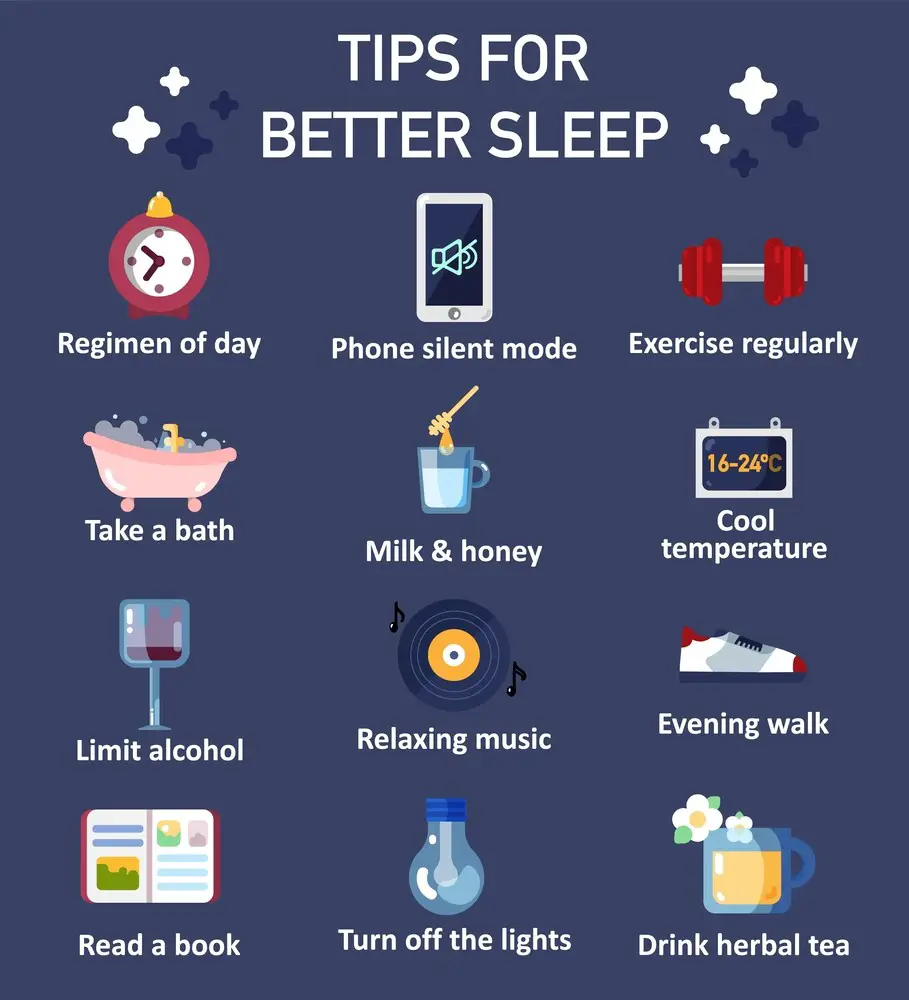As a BetterHelp affiliate, we receive compensation from BetterHelp if you purchase products or services through the links provided
If you’re taking Prozac (fluoxetine) and struggling with sleep, you’re not alone. Prozac, an antidepressant, can cause insomnia in around 30 to 40 percent of users. But don’t fret; various sleep aids can be taken with Prozac to help improve your slumber. It’s essential to pick a sleep aid that works well with Prozac and doesn’t create unwanted side effects or interactions.
Before taking any sleep aids with Prozac, it’s crucial to consult your doctor or pharmacist. Based on your circumstances and medical history, they can help determine the best course of action. Additionally, they’ll keep in mind factors like other medications you may be taking and any underlying health conditions to ensure you achieve a restful sleep without risking your health.
Apart from prescription medications, there are also natural sleep aids that can be effective in helping you sleep while taking Prozac. These alternative options can relieve insomnia while posing a lesser risk of side effects and drug interactions. Developing a sleep routine and incorporating healthy habits can also improve sleep quality.
Key Takeaways
- Prozac can cause insomnia, but sleep aids can help improve sleep quality
- Consult your doctor or pharmacist before taking sleep aids with Prozac
- Natural sleep aids and sleep routines may offer relief without significant risks
 Understanding Prozac and Its Connection With Sleep
Understanding Prozac and Its Connection With Sleep
Prozac, also known by its generic name fluoxetine, is a selective serotonin reuptake inhibitor (SSRI) often prescribed to treat a major depressive disorder, anxiety, and other mental health conditions. It works by increasing serotonin levels, a neurotransmitter vital in regulating mood and sleep.
However, one common side effect of Prozac is sleep disturbances, such as insomnia or disrupted sleep patterns. Prozac-induced insomnia affects about 30 to 40 percent of people taking the medication. The reason behind this is the connection between serotonin and the sleep-wake cycle.
Serotonin is vital for regulating mood and plays a significant role in controlling your sleep-wake cycles. By increasing serotonin levels, Prozac may inadvertently interfere with your natural sleep patterns and lead to difficulty falling or staying asleep.
To address Prozac-induced sleep disturbance, several sleep aids can be taken in conjunction with Prozac, but it’s essential to ensure they don’t trigger other side effects or interactions. One sleep aid that is generally considered safe to take with Prozac is melatonin. This natural hormone helps regulate sleep-wake cycles and can improve sleep quality.
However, it’s crucial to consult your doctor before taking any sleep aids with Prozac to ensure safety and determine the appropriate dosage. Your healthcare professional may also suggest other strategies to ease insomnia, such as maintaining a consistent sleep schedule, creating a relaxing bedtime routine, or regular exercise.
In conclusion, understanding the connection between Prozac and sleep is vital for effectively managing sleep disturbances as a side effect of the medication. Use the information to consult your doctor about suitable sleep aids and develop a comprehensive approach to improve your sleep quality while taking Prozac. Remember, your mental health and well-being are the top priorities, and addressing sleep issues can significantly contribute to your overall recovery.

Potential Side Effects of Prozac on Sleep
Prozac, also known as fluoxetine, is an antidepressant medication that can help with a variety of mental health conditions. While it can be beneficial for many people, it also comes with some side effects, particularly related to sleep. In this section, we will discuss some potential side effects you may experience while taking Prozac.
- Dizziness: One side effect you may experience is dizziness. This can make it uncomfortable for you to move around or even lie in bed, making it difficult to fall or stay asleep. Try to ensure that you get up slowly from a seated or lying position to minimize the impact of dizziness.
- Drowsiness: Another side effect of Prozac is drowsiness. While this might seem helpful for sleep, it can also lead to excessive fatigue during the day, making it hard to maintain a healthy sleep schedule. Establish a regular bedtime routine and avoid stimulating activities close to bedtime to counter this.
- Difficulty concentrating: Prozac may also cause difficulty concentrating, making it hard to relax and wind down before sleep. Developing relaxation techniques, such as deep breathing or meditation, may help improve concentration and prepare your mind for rest.
- Fatigue: Fatigue is another common side effect of Prozac, and it can leave you feeling exhausted throughout the day. This might seem beneficial when it comes to sleep, but chronic fatigue can disrupt your sleep pattern and make it harder to fall asleep at night. Ensuring you have a comfortable sleep environment and getting some light exercise during the day can help manage fatigue.
- Nausea: Nausea is another potential side effect of Prozac, making it difficult to feel comfortable enough to fall asleep. If you experience nausea, try eating a light snack before bed or sipping ginger tea, as these can help settle your stomach.
While these side effects may be unpleasant, many tend to improve over time as your body adjusts to the medication. If you find these side effects severely impacting your ability to sleep or function during the day, it’s important to discuss your concerns with your healthcare provider. They may be able to adjust your medication or suggest alternative treatments to help manage these side effects.
Professional Intervention: Doctor and Pharmacist
It’s essential to consult with your doctor or healthcare provider before combining any sleep aid with Prozac. This will ensure that you receive the most appropriate, safe, and effective treatment for your insomnia. Here are some key steps in the process:
- First, schedule a consultation with your primary care physician. Explain your sleep problems and ask if they can help find a solution that works well with your Prozac prescription.
- If your doctor recommends a specific sleep aid, ask for any potential side effects, interactions, or precautions to consider.
- Always consult with a pharmacist when picking up your sleep aid prescription, as they can provide valuable information on the proper dosage and usage and any potential interactions with Prozac.
- Follow the instructions provided by your healthcare provider and pharmacist. Be mindful of any changes in your sleep patterns, mood, or overall well-being, and report them to your doctor accordingly.
Being proactive and maintaining open communication with your doctor and pharmacist is crucial for achieving the best results in your treatment. Remember that each person’s circumstances are unique, and the most effective approach might differ from one individual to another. Trust in the expertise of healthcare providers in guiding you toward a safe and effective solution for your insomnia while taking Prozac.
 Recognizing Sleep Disorders
Recognizing Sleep Disorders
Sleep disorders can seriously impact your life, making it essential to identify them and seek appropriate treatment. There are several common sleep disorders, which we’ll discuss in this section.
Insomnia is the most common sleep disorder, characterized by persistent difficulty falling asleep and staying asleep. It can result from stress, an irregular sleep schedule, or other underlying health conditions. If you consistently struggle to get a good night’s sleep, you might be experiencing insomnia.
REM sleep behavior disorder occurs when the paralysis accompanying REM sleep fails to take effect. Instead of remaining immobile during dreams, those affected may act out their dreams physically, leading to potential injury or sleep disruption. If you or your partner notice unusual movement during sleep, consult a healthcare professional.
Disrupted sleep refers to frequently waking up at night, preventing you from achieving a full night’s sleep. Various factors, including stress, noise, sleep apnea, or an uncomfortable sleeping environment can cause this.
Sleep deprivation occurs when you consistently get less sleep than your body needs, leading to impaired cognitive function, mood changes, and increased risk of accidents. Common causes include poor sleep habits, work demands, and medical conditions that disrupt sleep.
Lack of sleep is another term for insufficient sleep, which can negatively affect your health and well-being. It can cause irritability, fatigue, and difficulties in concentration. Making an effort to prioritize sleep in your daily routine can significantly improve your overall quality of life.
Recognizing the signs is important for addressing your sleep disorder and finding appropriate treatment. Some possible ways to improve sleep might include managing stress, developing a consistent sleep schedule, and seeking medical advice when necessary.
 Sleep Aid Options to Consider with Prozac
Sleep Aid Options to Consider with Prozac
When considering sleep aids to take alongside Prozac (fluoxetine), it’s crucial to consult with your doctor, as combining medications may heighten certain side effects. Below are some options that may be safe for use with Prozac:
- Melatonin: This natural sleep hormone is generally deemed safe with Prozac. Remember that it’s essential to discuss the appropriate dosage with your healthcare provider.
- Trazodone: As a low-dose antidepressant, trazodone may be prescribed to help with sleep issues. However, combining it with fluoxetine might increase the risk of side effects such as serotonin syndrome. Consult with your doctor before taking trazodone.
- Over-the-counter sleep aids: Antihistamines, such as diphenhydramine (Benadryl) and doxylamine, are common sleep aids. While they may effectively induce drowsiness, combining them with Prozac could lead to moderate interactions. Discuss this option with your physician as well.
- Prescription sleeping pills: There are several prescription sleep medications on the market, such as zolpidem (Ambien), eszopiclone, and zopiclone. While they can help with short-term insomnia, their interaction with Prozac should be carefully evaluated by your doctor.
- Alternative antidepressants: In some cases, opt for other antidepressants like mirtazapine or low-dose amitriptyline, which have sedating effects and may help you sleep better.
To sum it up, when looking for a sleep aid to use alongside Prozac, consulting your healthcare provider is of utmost importance. They can help you determine the safest and most effective options to address your sleep issues while taking fluoxetine.
Understanding Drug Interactions
When taking medications like Prozac, it’s essential to consider possible drug interactions and risks. Combining certain substances with Prozac may lead to increased side effects, reduced effectiveness, or other complications. This section will cover some of these risks and provide helpful information for safely managing your treatment plan.
- Drug Interactions: Prozac, whose generic name is fluoxetine, is an antidepressant in the selective serotonin reuptake inhibitor (SSRI) class. It’s crucial to know medications that may interact with Prozac, such as sedatives and other serotonergic drugs. Combining Prozac with sleep aids containing doxylamine, for example, may increase side effects like dizziness, drowsiness, confusion, and difficulty concentrating. For elderly people, there may be additional risks, like impaired motor coordination or judgment.
- Serotonin Syndrome: Prozac increases the levels of serotonin in your brain. While this helps lift your mood, combining serotonin-boosting medications or supplements can result in dangerously high serotonin levels, a condition known as serotonin syndrome. Symptoms can range from mild, like shivering and diarrhea, to severe, such as hallucinations, seizures, and unconsciousness. Be cautious when combining Prozac with other serotonergic drugs, like tryptophan, St. John’s Wort, or certain migraine medications.
- Alcohol: Alcohol interferes with the effectiveness of many medications and can also interact with Prozac. Mixing alcohol with Prozac may increase drowsiness and dizziness, impair your ability to concentrate or think clearly. It’s generally advised to avoid or limit your alcohol consumption while taking Prozac to minimize potential risks.
When looking for sleep aids that can be taken with Prozac, consider options like melatonin, a naturally occurring hormone that regulates sleep-wake cycles. Melatonin is over-the-counter and can help improve sleep quality without posing significant interaction risks. Always consult your healthcare provider before combining any medications or supplements with Prozac, as they can provide personalized advice based on your specific situation and medical history.
Natural Sleep Aids: An Alternative Option
If you’re taking Prozac and looking for sleep aids, natural alternatives can be great. These options minimize potential interactions or side effects and help you find restful sleep.
Valerian root is a popular natural sleep aid that has been used for centuries. It works by increasing GABA, a neurotransmitter that promotes relaxation. You can take valerian in various forms, such as teas, capsules, or tinctures.
Lavender is another effective natural sleep aid that can be used in various ways. You can use lavender essential oil in a diffuser or add a few drops to your pillow. Alternatively, you could use a lavender-scented spray or drink lavender tea before bedtime.
Chamomile, a well-known herb, is often used as a sleep aid. Drinking chamomile tea before bed can help calm your mind, promoting relaxation that may make it easier to fall asleep.
Incorporating certain supplements and herbs can also be beneficial for your sleep. Some examples include melatonin, magnesium, and passionflower. As always, consult your healthcare provider before adding new supplements to your routine.
Paying attention to your diet and eating habits can also impact your sleep quality. Eating foods rich in tryptophan, a precursor to melatonin, can help. Examples include turkey, milk, nuts, and seeds. Additionally, avoiding heavy meals and minimizing caffeine intake close to bedtime is essential for good sleep hygiene.
Remember, it’s essential to try different natural sleep aids and find which ones work best for your personal needs. Consult with your healthcare provider to ensure no interactions between your chosen natural sleep aids and Prozac and to create a bedtime routine that helps you achieve restful sleep.
 Importance of Sleep Routine and Other Tips
Importance of Sleep Routine and Other Tips
A consistent sleep routine is crucial when dealing with sleep issues, especially if you’re taking Prozac. Establishing a regular sleep-wake cycle helps improve the quality of your rest and ensures that your body is in sync with its natural rhythms. Here are some valuable tips to help optimize your sleep routine while taking Prozac:
- Stick to a Schedule: Aim to go to bed and wake up simultaneously every day. Consistency reinforces your body’s sleep-wake cycle and makes falling asleep at the designated time easier.
- Take Prozac in the morning: If you struggle with insomnia, consider taking your Prozac dose in the morning. This can minimize its impact on your sleep later in the evening.
- Create a Sleep-Friendly Environment: Make your sleeping space comfortable, quiet, and dark. Eliminate noise and distractions, and maintain an optimal temperature for sleep.
- Be Mindful of Exercise Timing: Regular physical activity is essential for overall health and can improve sleep quality. However, avoid exercising too close to bedtime, as it may interfere with your ability to wind down.
- Monitor Caffeine and Alcohol Consumption: Both caffeine and alcohol can disrupt your sleep, so be conscious of your intake, particularly in the hours leading up to bedtime.
- Undergo Regular Check-ups: Stay on top of your health by undergoing regular tests and check-ups with your healthcare provider. They can help monitor the effectiveness of your Prozac and sleep routine and address any underlying issues that may be affecting your sleep or mood.
Remember, a structured sleep routine combined with these helpful tips can significantly improve your sleep experience while taking Prozac. Stay consistent and communicate with your healthcare provider if you experience persistent sleep problems or have concerns regarding your medication.
Effect of Sleeping Aids in Special Populations
In your article about sleep aids taken with Prozac, it’s essential to shed light on how they impact special populations like the elderly, pregnant individuals, and older adults. Let’s dive into each category:
Elderly: Older adults need to exercise caution when considering sleep aids. Their bodies may metabolize medications slower, leaving them prone to side effects. It’s wise for the elderly to seek medical advice before combining Prozac with sleep aids, as they might be more sensitive to the effects of both drugs.
Pregnant individuals: Sleep aids can pose risks during pregnancy. It’s important to discuss your options with a healthcare professional if you’re pregnant, considering Prozac, and having trouble sleeping. Your doctor will determine if the potential benefits outweigh the risks and recommend safer alternatives if necessary.
Older adults: Similar to the elderly, older adults might experience a slower metabolism, affecting their bodies’ response to sleep aids and Prozac. Consulting a doctor is crucial for older adults, as they can ensure the proposed medication is safe for you and your unique needs.
Remember:
- Always consult your healthcare professional before combining Prozac with sleep aids, especially if you belong to a special population.
- Your doctor will consider your age, medical history, and specific needs when recommending the right sleep aid.
- Maintaining open communication with your healthcare provider is crucial to manage your insomnia effectively and safely with Prozac.
Frequently Asked Questions

Can I combine melatonin with Prozac for better sleep?
Yes, you can combine melatonin with Prozac for better sleep. Melatonin is a hormone naturally produced by the body to regulate sleep-wake cycles. It helps improve sleep quality and is available over-the-counter. However, it’s best to consult your doctor about the appropriate dosage and timing before using melatonin with Prozac.
What alternatives are there for managing Prozac-induced insomnia?
If you’re experiencing Prozac-induced insomnia, there are several strategies to help manage this side effect:
- Establish a regular sleep schedule: Go to bed and wake up simultaneously each day, even on weekends.
- Create a sleep-friendly environment: Keep your bedroom cool, dark, and quiet.
- Limit screen time before bed: Avoid smartphones, tablets, and TV screens at least an hour before bedtime.
- Exercise regularly: Finish your workout at least a few hours before bed.
- Practice relaxation techniques: Try deep breathing exercises, meditation, or gentle stretching before bed.
Is it safe to take sleeping pills while on antidepressants?
It depends on the specific sleeping pill and antidepressant. Some sleep aids, such as doxylamine (Sleep Aid), may interact moderately with fluoxetine (Prozac), increasing the risk of side effects. It’s crucial to consult your doctor before combining sleeping pills with antidepressants to ensure your safety.
How long does SSRI-related insomnia last?
SSRI-related insomnia duration can vary. Some individuals may experience insomnia only during the initial weeks of starting an SSRI like Prozac, while others may have this side effect persist throughout their treatment. If insomnia becomes a significant issue, speak with your doctor about adjusting your medication or adding a suitable sleep aid.
Can I use Unisom alongside Prozac?
Unisom contains doxylamine, which may interact moderately with Prozac (fluoxetine). It’s essential to consult your doctor before using Unisom alongside Prozac to ensure it’s safe for your situation.
Are there specific sleep aids recommended during pregnancy and Prozac use?
While melatonin is generally considered safe with Prozac, its safety during pregnancy is unclear. It’s crucial to consult your doctor before using any sleep aid during pregnancy, particularly if you’re also taking Prozac. Your healthcare provider can recommend the most appropriate and safest sleep aid options for your situation.
- How to Transform a Home’s Patio Space into a Relaxing Space - March 23, 2025
- 5 Strategies to Use a Cell Phone to Help Manage Your Stress - March 23, 2025
- 4 Ways to Use Measurements to Create a Relaxing Sleep Space - March 23, 2025
This site contains affiliate links to products. We will receive a commission for purchases made through these links.


 Understanding Prozac and Its Connection With Sleep
Understanding Prozac and Its Connection With Sleep Recognizing Sleep Disorders
Recognizing Sleep Disorders Sleep Aid Options to Consider with Prozac
Sleep Aid Options to Consider with Prozac Importance of Sleep Routine and Other Tips
Importance of Sleep Routine and Other Tips
